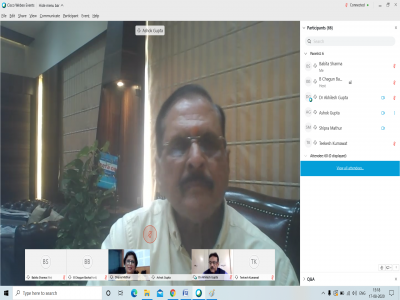National Webinar on India’s Science Technology and Innovation Policy Formulation: Status and Way Forward

The IIS (Deemed to be University) organised a National Webinar on India’s Science Technology and Innovation Policy Formulation: Status and Way Forward in association with DST and STIP Secretariat on August 17th, 2020. The Keynote Speaker for the Webinar was Dr. Akhilesh Gupta, Adviser/Scientist-G & Head, STIP-2020 Secretariat; Head, Policy Coordination & Programme Management (PCPM); Division Head, Strategic Programmes, Large Initiatives and Coordinated Action Enabler (SPLICE) Division and Climate Change Programme, Department of Science & Technology, New Delhi. The Webinar was organized online on WebEx platform, which was also streamed live on YouTube for the students of Department of Journalism and Mass Communication and others to watch.
The Webinar commenced the brief introduction of current Science and Technology and upcoming STIP’2020 presented by Dr. Shipra Mathur, Advisor, Department of Journalism and Mass Communication, IIS (Deemed to be University). After that Dr. Ashok Gupta, Chancellor, IIS (Deemed to be University) gave welcome note. After the welcome note, Dr. Ashok Gupta invited, Dr. Akhilesh Gupta to speak further.
Dr. Akhilesh Gupta began his talk by acquainting the attendees with India and Rajasthan’s place in the field of Science, Technology and Innovation. He pointed out that India is on third position in terms of total number of start-ups and UNICORNS. He also shared their India ranks third as far as number of PhDs is concerned. India’s Research Citation Index has also increased evidently in past one decade.
Dr. Akhilesh also talked about the context of science, technology and innovation policy. He further discussed about the need of new science, technology and innovation policy for our country due to the rapid transformation in the field in recent years. He highlighted the unique features of new STI policy i.e. inclusive, bottom-up, decentralised, expert driven and evidence supportive.
Continuing the discussion he talked about the 4-track process of STIP 2020 formulation. Track I aims to create a repository of public voices that
will act as a guiding force for the drafting process. Track II consultations comprises 21 expert-driven thematic collectives to feed evidence based
recommendations into the policy drafting process. Track III brings together Ministries and States in extensive engagement through nominated nodal officers. Track IV is the binding force that draws upon apex level multi-stakeholder engagement at the national and global levels. Inputs from these wide-ranging deliberations will finally lead to STIP 2020. He concluded with highlighting priority issues to be addressed while formulating STI policy.
The session was open for questions and answers from the attendees and YouTube live viewers after Dr. Akhilesh Gupta’s address. Dr. Shipra Mathur presented the vote of thanks in the end of the webinar.

